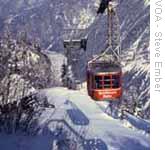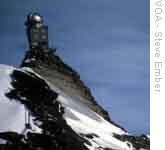VOA慢速英语-SCIENCE IN THE NEWS - Spacecraft Carries Out More Te
搜索关注在线英语听力室公众号:tingroom,领取免费英语资料大礼包。
(单词翻译)
Also: Reduction in snow hurts Switzerland's winter-sports industry. Transcript1 of radio broadcast:
07 July 2008
VOICE ONE:
This is SCIENCE IN THE NEWS in VOA Special English. I'm Steve Ember.
VOICE TWO:
And I'm Faith Lapidus. Hot weather has returned to many parts of Earth's northern hemisphere. For something different this week, we will tell about three studies involving snow or ice.
(MUSIC)
VOICE ONE:
Water has long been considered important to the development of life. That is why scientists are so interested in finding water in our solar system. Now, the American space agency has confirmed that there is water ice on the planet Mars.
The discovery is a major step in the search for the conditions for life on the red planet. The discovery was made with the help of an American spacecraft, the Phoenix2 Mars Lander. The spacecraft landed on the extreme north of Mars on May twenty-fifth. In two thousand two, the space agency's Mars Odyssey3 spacecraft made observations suggesting that large amounts of water could be found there.
VOICE TWO:
The Phoenix Mars Lander has a robotic arm for digging. On June fifteenth, it dug a hole about seven centimeters deep in the Martian soil. The hole contained small particles of a light-colored substance. Scientists wondered whether the substance was frozen carbon dioxide, salt or water ice.
 |
| These images from NASA's Phoenix Mars Lander show particles on the surface of Mars, left. Days later, the particles have disappeared, right. |
Pictures showed that the particles were still there one day later. But by June nineteenth, the particles had disappeared. Scientists believe the pieces must have evaporated, which they would not have done if they were salt. The pieces also remained solid longer than they would have if they were carbon dioxide. That was enough evidence for the American space agency to announce that water ice had finally been directly observed on Mars.
VOICE ONE:
Doug McCuistion is director of the space agency's Mars Program. He said the discovery proved that the agency's plan to "follow-the-water" in its explorations of the planet had been a success.
The lander has attempted to dig other holes. But it has found a hard level of ground just below the surface. Researchers believe this may mean there is ice just below the surface where the spacecraft landed.
The space agency wants to test the Martian water to see if it has been liquid at some time in the past. Chemicals tests will tell a story of how water has existed on the planet over time.
VOICE TWO:
The Phoenix Mars Lander also has the ability to test the Martian soil. The Thermal4 and Evolved-Gas Analyzer, or TEGA, is a device that heats soil up to one thousand degrees Celsius5. It then tests the gases released to find out what the soil contains. American scientists will spend weeks studying the complex results of the first experiments done with TEGA.
However, scientists already know much more about the soil of Mars than they did before. Sam Kounaves is lead scientist for the wet chemistry investigation6 for the lander. He says the soil is very similar to soil found in dry valleys in Antarctica. Mister Kounaves says early results show that the soil contains a number of nutrients7 needed for life as we know it.
(MUSIC)
VOICE ONE:
An American study has suggested that melting ice in the Arctic Sea is threatening permanently8 frozen soil. The study found that rates of warming in northern Alaska, Canada and Russia could increase when the sea ice melts quickly. During such periods, the increase could be more than three times greater than the average twenty-first century warming rates predicted in earlier studies.
The new study is the work of scientists from the National Center for Atmospheric9 Research and the National Snow and Ice Data Center. The findings were reported last month in Geophysical Research Letters, a publication of the American Geophysical Union.
VOICE TWO:
The National Center for Atmospheric Research says the study resulted partly from events last summer. At that time, Arctic Sea Ice levels decreased to more than thirty percent below average. Air temperatures over land in the western Arctic were unusually high between August and October last year. They were two degrees Celsius higher than the average temperature between nineteen seventy-eight to two thousand six.
The American scientists wondered whether the low ice levels and warm land temperatures were linked. They examined climate change estimates from a program called the Community Climate System Model. Earlier studies suggested that a period of sudden ice loss, lasting10 five to ten years, could result when the sea ice is thin enough.
VOICE ONE:
The scientists found that the rate of Arctic land warming is three and one half times greater than the warming rates predicted in the earlier studies. They found that the higher temperatures are greatest over ocean waters. But the computer programs suggest the warming increases during such events, especially during autumn. In a period of sudden ice loss, autumn temperatures along the northern coasts of Alaska, Canada and Russia could rise by as much as five degrees.
The scientists then investigated the influence of a sudden warming on permanently frozen soil, also known as permafrost. They found that sudden sea-ice loss could lead to permafrost disappearing in areas where the soil is already at risk.
VOICE TWO:
One concern scientists have is that taliks will form. A talik results when permafrost forms above permanently frozen soil and under soil that is frozen during parts of the year. Taliks hold heat, which can speed up the break-up of permafrost.
The National Center for Atmospheric Research notes that Arctic soils are believed to hold thirty percent or more of all the carbon stored in soils worldwide. Scientists are unsure what will happen to this carbon as soils warm and permafrost melts. One possibility is that the melting will result in the additional release of carbon dioxide. The gas has been linked to rising temperatures in Earth's atmosphere.
(MUSIC)
VOICE ONE:
 |
| SchilthornBahn carries skiers and other visitors from Lauterbrunnen Valley to Piz Gloria in the Jungfrau area of Switzerland |
A new report says areas where most people live in Switzerland have had winters with record low amounts of snow for the past twenty years. Scientist Christoph Marty says the areas lost between twenty and sixty percent of their snow days during those years. Such losses have not happened since people started to keep snow depth records more than a century ago.
The report defines a snow day as a day with a snow depth larger than the historic average. Snow days are a major issue for the winter-sport industry in Switzerland. A lack of snow during the winter of two thousand six and two thousand seven caused cancellation11 of sporting events. Fewer visitors came to Switzerland.
VOICE TWO:
Christoph Marty works at the Swiss Federal Institute for Snow and Avalanche12 Research in Davos. He examined at least sixty years of records from thirty-four weather stations. The findings were reported in Geophysical Research Letters.
The weather stations studied were between two hundred to one thousand eight hundred meters above sea level. The study found that the number of snow days changed little for the forty years beginning in nineteen forty-eight. However, the number dropped fast near the end of the nineteen eighties. During the same period, temperatures in Earth's atmosphere rose.
VOICE ONE:
 |
| Jungfrau Weather Station on top of Sphinx Terrace in Switzerland |
Mister Marty does not directly link the decrease in snow days with evidence of climate change. He says the sudden change in snow days happened at weather stations in cities, rural areas and on mountains. He says a condition like heat from city centers did not suddenly reduce the number of snow days twenty years ago.
Instead, he says, a combination of conditions may have been responsible. One possible condition is that air pollution in Europe has decreased. The effect of the decrease may have permitted more sunlight to heat the ground. The second possibility is that winter high-pressure systems hung over central Europe at the start of the nineteen nineties. That condition created very small droplets13 of water in the low lands. But the high-pressure systems also meant more sunshine in the mountains.
Mister Marty believes that climate change will have a regrettable effect in the future. Warmer conditions are not good news for snow sports in the Alps. He says the effect may prevent temperatures and snow days from returning to their levels of before nineteen eighty-eight.
(MUSIC)
VOICE TWO:
This SCIENCE IN THE NEWS program was written by Mario Ritter, Elizabeth Stern and Jerilyn Watson. Brianna Blake was our producer. I'm Faith Lapidus.
VOICE ONE:
And I'm Steve Ember. Join us again at this time next week for more news about science in Special English on the Voice of America.
 收听单词发音
收听单词发音 




